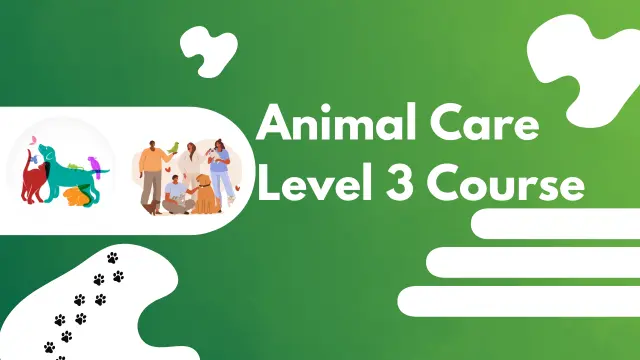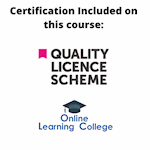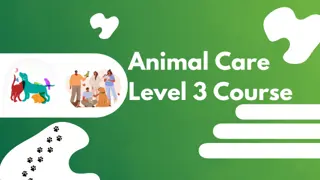
Animal Care Level 3 Course
Online Learning College
Summary
- Certificate of completion - Free
- Tutor is available to students
- TOTUM card available but not included in price What's this?
Add to basket or enquire
Overview
Understanding how to care for animals is something which can be adopted at home or at work and this Animal Care Level 3 course covers the necessary requirements for this. This course covers a variety of different areas including feeding, accommodation, health care needs and animal behaviour to give learners an in-depth understanding of animal care.
Course media
Description
About this Course
Studying for the Animal Care Level 3 course with us will give you an insight into various different aspects of caring for different animals and what needs they have. This course is great for learning the different requirements of animals for anyone that cares for animals in their work or at home.
Study Time: 100 hours
Enrolment length: 12 months
Course Format: Online
Entry Requirements: None Specific
Upon completion of this course students are awarded a Quality Licence Scheme certification and an OLC Certificate. All certification fees are included in your course fees.
Certification
To gain this Animal Care Level 3 certification you will need to submit, and pass, all of the tutor marked assignments. There are six assignments in the course and no need to purchase any textbooks as we provide all of the lessons and materials required to learn the syllabus.
All assignments are coursework based and are in an essay/question and answer style to test your knowledge of the topics covered in each of the course sections.
Course Content
This course assesses the following units:
Unit 1: Nutritional requirements of animals
- Understand the different types of animal feeders
- The nutritional requirements of food, what they are, where they are found and why they are needed
- How to choose the correct food
- The quantity and timing of feeding
- The storage and disposal of food
- Some examples of not meeting an animals nutritional requirements
Unit 2: Housing requirements of animals
- State the housing requirements of animals
- List the different types of bedding materials
- List the fixtures and fittings different animals require
- Explain how to clean and maintain different animal accommodation
- Describe the different ways that waste is disposed of correctly
Unit 3: Health and well-being of animals
- Explain the ways in which diseases can be prevented
- List the common diseases found in cats, dogs and rabbits
- Understand what is meant by the terms endoparasite and ectoparasite and be able to list examples of each
- Discuss the signs of health in animals
- Be able to explain first aid procedures and their remedies
Unit 4: Animal handling
- Understand why we need to handle, restrain and move animals
- Understand personal protective equipment and why we use it
- Identify different types of handling and restraint equipment
- Reduce stress when handling, restraining and moving animals
Unit 5: Behaviour and training
- Describe the normal and abnormal behaviour of a range of animals
- State the emotions that are shown by animals
- Understand why we observe the behaviour in animals and state the methods of observing and recording
- List the ways in which abnormal behaviour can be reduced and avoided
- Understand what is meant by the word enrichment and come up with strategies of providing environmental enrichment
Unit 6: Working with animals
- Identify animal welfare needs and will be able to discuss how we can meet these needs
- Explain what the animal welfare act 2006 is and how it relates to looking after animals
- Understand the current legislation that needs to be followed when dealing with animals
- List the animals used in production and be able to list the items produce
- Understand what intensive farming is and be able to compare it to free range and organic farming
This course can be taken over a 12 month period but you can complete it as fast or as slowly as you wish.
Assessments
To pass this course learners must pass 6 assignments. These are completed after navigating through the corresponding lessons and writing your answers to assignment questions. Once these have been read and marked by your personal tutor, feedback and marks are provided to students which contain helpful tips to improve work in future assignments.
Method
All of our students are given access to our online campus through their own personal login and password. Once logged in you can access your course materials, lessons, resources and assignments in your own time. Assignments are uploaded through your account and the process is easy intuitive. Our online campus includes:
- 24/7/365 access to all of your course materials- all lessons, assignments and resources are available from the moment you enrol
- Instant access to your course after you enrol- start studying immediately!
- Integrated chat and messaging systems so that you can contact your tutor
- Online assignment uploads to save time in returning marks and feedback.
- Links to further resources and information available on courses
- Self-led learning on all courses- study in your own time and work through your assignments at your own pace
- Safe e-portfolio of your work is kept under lock and key on our secure servers
- Progress bar to show the work you have completed and how many tasks you still have to complete on your course
- Detailed help centre with step-by-step instructions on getting the most from your course and how to upload assignments and contact your tutor
Support
The most important tool that all of our students have at their disposal is their tutor. When studying for a course with us you are assigned a personal tutor with indepth knowledge and experience in your chosen subject.
You are strongly advised to make use of your tutors expertise and ask questions about the course content. Your assignments are marked by your personal tutor and detailed feedback is given. As well as this your tutor will provide you with pointers and advice on where you can improve- this helps you to get the most from your courses and constantly improve your skills.
Enrolment Length
All of our courses are allocated plenty of time for students to complete their studies and all materials are self-led so that you can complete the course at your own pace. Should you require additional time on one of our courses you can extend your enrolment by 30 days for an additional fee of £60.
As well as this we operate a 14 day money back guarantee on every one of our qualifications- that’s how confident we are of how you will love studying with us!
Who is this course for?
Anyone looking to work with animals or progress in their career within animal care.
Requirements
There are no entry requirements.
Career path
Veterinary Assistant
Questions and answers
Currently there are no Q&As for this course. Be the first to ask a question.
Certificates
Certificate of completion
Digital certificate - Included
Reviews
Currently there are no reviews for this course. Be the first to leave a review.
Legal information
This course is advertised on reed.co.uk by the Course Provider, whose terms and conditions apply. Purchases are made directly from the Course Provider, and as such, content and materials are supplied by the Course Provider directly. Reed is acting as agent and not reseller in relation to this course. Reed's only responsibility is to facilitate your payment for the course. It is your responsibility to review and agree to the Course Provider's terms and conditions and satisfy yourself as to the suitability of the course you intend to purchase. Reed will not have any responsibility for the content of the course and/or associated materials.




